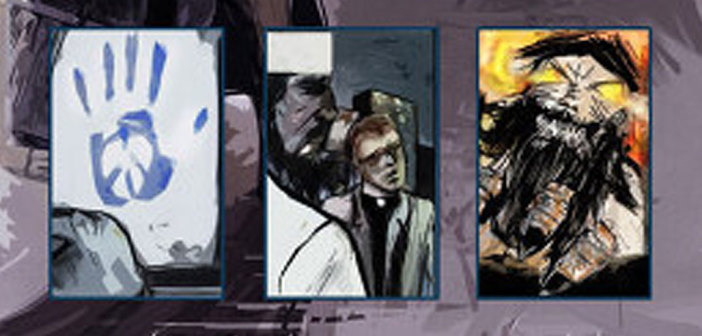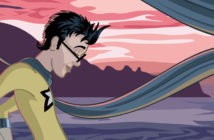Independent comics tend to fall into one of two categories: those that aspire to join the mainstream and those that have something to say, popularity be damned. Jag Lall’s Death’s Door: Ignorance Likes Company is the latter, and it deserves a heartfelt round of applause for the courage of its content and the confidence of its craft. This is a poignant book designed with young adults in mind, but it’s a story for all ages about the fundamental differences in all of us and the dangerous judgments we pass.
The plot doesn’t matter much in this book. It’s the urgency of the motive that does, a motive that’s been seething in the United States ever since 19 Islamic radicals killed 3,000 civilians and wounded at least another 6,000 more on September 11, 2001. The same tragedy struck again four years later in England when the London Underground and one double-decker bus were bombed, killing more than 50 and injuring nearly 700 on July 07, 2005. This attack was also carried out by Islamic radicals, this time in response to the United Kingdom’s involvement in the Iraq War.
It’s of little surprise that a frenzied fear of Islam and Middle-Easterners ensued in both the U.S. and the U.K. Acceptable? No, not really. Dangerous? Yes, very much so. And it’s the danger that Lall draws his inspiration from for Death’s Door, resulting in a story that doesn’t shy away from revealing the harshest of resulting consequences when wild fear takes a hold of any and all of us.
The night hangs over London at the opening of Death’s Door: the police have surrounded a Middle-Eastern man standing in the street holding a briefcase, which turns out to be his only crime. The news channels are all over the situation; they report that a terror suspect with a possible bomb is being held at gunpoint. The man is searched and proven innocent, but it doesn’t matter. There exists a radical fringe in every society and culture—a fringe always certain of its own certainty—and in the case of Lall’s book, the situation escalates into blood and tragedy.
I’ll refrain from explaining the plot further; if anymore is said, it will detract from the beauty of the book: its simplicity. Death’s Door is a work of primal emotion that will leave everyone questioning their own prejudices and judgments. Profiling and stereotyping is something that we all engage in during moments of great duress, and whether or not it’s understandable, Lall manages to demonstrate the extreme consequences of overreaction.
This isn’t a book that makes excuses for Islamic fundamentalism, nor is it a defense of any one religion. It’s a secular parable meant to teach a human law that groups and minorities are not completely responsible for the actions of a few crazed fanatics. Never forget that only nine years before September 11, Muslims were the victims of ethnic cleansing in the town of Visegrab during the Bosnian War. Joe Sacco’s stunning Safe Area Goražde recounts the brutal genocide in stark detail, illustrating Serb soldiers marching Islamic men, women, and children up onto the bridge suspended over the Drina River night after night. The soldiers lined their victims up, cuts their throats, and dropped the bodies into the icy waters below. This one act of mass murder soundly illustrates Lall’s subtitle—ignorance certainly does like company.
One of the book’s greatest strength’s is Lall’s unique artwork. It’s a style not typical of comics, but then this is not a comic typical of the medium. The creator’s illustrations look like pastel sidewalk drawings beginning to wash away, evoking a ghostly appearance. When the art operates on a textual level, the colors appear bleak and drained of life; when the art operates on a symbolic level, it’s fiery and screaming.
Death’s Door: Ignorance Likes Company is a comic book that stands in the great company of Joe Sacco’s Safe Area Goražde and Palestine, Sid Jacobson and Ernie Colon’s The 9/11 Report: A Graphic Adaptation, Allison Torres’ American Widow, and even Alison Bechdel’s Fun Home. It forces readers to not only see the consequences of crazed fear and condemnation, but it also poses a universal question that probes everyone reading to wonder if they’ve engaged in such judgments, themselves.
This comic book review originally appeared on Broken Frontier on 01 October 2009.




